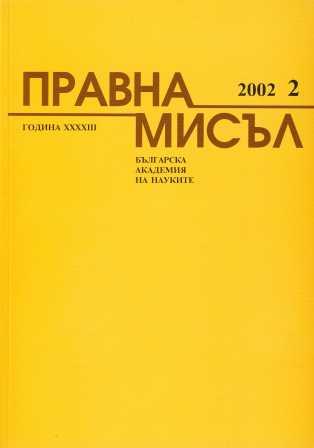Реформата в гражданското съдопроизводство и промените в отмяната по чл. 231 ГПК
The Reform of Civil Procedure and the Changes in Annulment Proceedings under Art. 231 of the Code of Civil Procedure (State Gazette, No. 124/1997 ...
Author(s): Blagovest PunevSubject(s): Law, Constitution, Jurisprudence
Published by: Институт за държавата и правото - Българска академия на науките
Summary/Abstract: The annulment under Art. 23 I of CCP has not been so radically affected by the civil procedure reform as the proceedings before the regular instances. The annulment procedure retained its basic characteristics as extraordinary control (instituted on grounds explicitly stipulated by the procedural code) over lower courts' decisions that have entered into force and rulings for termination of the proceedings. The new legal context established with the reform, however, has a repercussion on both the legal grounds for annulment and the application of the specific procedural rules thereof. An example of the above is the situation when a case is pending before the court of cassation where the party is not allowed to submit new statements and evidence even when the latter have not been known to it before the end of the oral pleadings before the appellate court. In order to present such statements and evidence in court the party has the alternative to either institute an annulment procedure under Art. 231 "a" of CCP, or present the evidence if and when the case is remanded for a new trial to be carried out by the appellate court under the provision of Art. 218-h of CCP. The situation is similar when the existence of certain relevant circumstances should be established first by a judgement of another court - either civil or criminal, and the proceedings before that other court have been instituted after the hearing of the case by the appellate court has finished. In such cases the proceedings before the court of cassation cannot be suspended under Art. 182, "d" of CCP in order to submit the mentioned circumstances so that the court when deciding on the merits could take it into consideration. The only way to do this is starting an annulment procedure under Art. 231 "a" of CCP. The situation is the same when a criminal offense has to be established prior to and for the purpose of the annulment procedures under Art. 231 "b" and "c" of CCP, by a criminal court sentence or by a civil court decision under Art. 97, par. 4 of CCP. The reform of civil procedure introduced new grounds for annulment those stipulated in the provisions of subparagraphs "e" and "h" of Art. 231 of CCP. The first provision concerns decisions of the cassation instance rendered in one and the same case by which the court of cassation overrides improper appellate instance decisions and returns the case with mandatory orders on the application of substantial law or/and procedural rules. When the orders in the different cassation decisions are contradictory the annulment of the wrong cassation decision together with giving the proper mandatory orders, will lead to the achievement of uniform application of the law and to the rending of a final decision of the case concerned...
Journal: Правна мисъл
- Issue Year: XLIII/2002
- Issue No: 2
- Page Range: 74-94
- Page Count: 21
- Language: Bulgarian
- Content File-PDF

